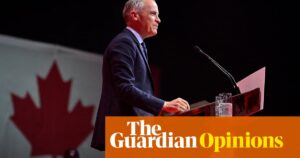
The Trump White House is furious with Amazon over reports that it plans to display the cost of tariffs on items it sells.
Press secretary Karoline Leavitt has just given the company both barrels, at her briefing with the media today.
Leavitt claims the move is “a hostile and political act by Amazon”, and asks why Amazon didn’t take a similar step when inflation hit 40-year highs under the Biden administration.
She also adds that it’s “not a surprise”, citing a report (from 2021) that Amazon partnered with a Chinese propaganda arm.
Leavitt argues:
So this is another reason why Americans should buy American. It’s another reason why we are onshoring critical supply chains here at home, to shore up our own critical supply chain and boost our own manufacturing.
Q: Is Jeff Bezos still a Trump supporter?
Leavitt declines to comment on the president’s relationships with Jeff Bezos, but reiterates that “this is certainly a hostile and political action by Amazon”.
Political analyst Ian Bremmer isn’t convinced by the White House’s argument against Amazon.
He suggests telling a customer the cost of tariffs on their goods is no different than flagging the sales tax on a receipt:
Blimey. The surge of imports into the US last month are a sign that America’s economy probably contracted at the start of this year, consultancy Capital Economics suggest.
Paul Ashworth, their chief North America economist, explains:
The advance economic indicators revealed a massive surge in consumer goods imports in March, as firms raced to beat the imposition of reciprocal tariffs in early April.
As a result, we now estimate that Q1 GDP contracted at a 2.0% annualised pace, down from our most recent estimate of a 0.1% gain.
We’re expecting the first estimate of US GDP for the last quarter to be released tomorrow…..
Shares in Amazon have dropped 1.3% at the start of trading, after the White House accused it of a ‘hostile’ act for showing consumers the cost of tariffs….
The Trump White House is furious with Amazon over reports that it plans to display the cost of tariffs on items it sells.
Press secretary Karoline Leavitt has just given the company both barrels, at her briefing with the media today.
Leavitt claims the move is “a hostile and political act by Amazon”, and asks why Amazon didn’t take a similar step when inflation hit 40-year highs under the Biden administration.
She also adds that it’s “not a surprise”, citing a report (from 2021) that Amazon partnered with a Chinese propaganda arm.
Leavitt argues:
So this is another reason why Americans should buy American. It’s another reason why we are onshoring critical supply chains here at home, to shore up our own critical supply chain and boost our own manufacturing.
Q: Is Jeff Bezos still a Trump supporter?
Leavitt declines to comment on the president’s relationships with Jeff Bezos, but reiterates that “this is certainly a hostile and political action by Amazon”.
America’s Asian trading partners and allies have been “the most forthcoming” in terms of doing trade deals, Treasury secretary Scott Bessent says.
He adds that vice-president Vance made some very good progress during his trip to India last week, and that the contours of a deal with South Korea are coming together.
Bessent then gives some “inside baseball” know-how in India, saying they are easier to negotiate with than many other countries because they have many very high tariffs.
So it’s much easier to confront the direct tariffs…than the non-tariff trade barriers which can be much more insidious and also harder to detect.
So a country like India, which has the posted and ready tariffs, it’s much easier to negotiate with them. So I think the India negotiations are moving well.
In what may prove a hostage to fortune, Treasury secretary Scott Bessent says he doesn’t expect supply chain shocks due to the slowdown in shipments from China.
Bessent says retailers have managed their inventory in front of this, explaining to the press pack:
I speak to dozens of companies, sometimes daily, but definitely weekly.
They know that President Trump is committed to fair trade and have planned accordingly.
Scott Bessent is then asked why Donald Trump has decided to cushion the impact of his tariffs on US carmakers by easing some duties on foreign vehicle parts.
The Treasury Secretary explains that Trump is committed to bringing back auto production to the US, so his administration wants to give automakers a path to do that “quickly, efficiently and create as many jobs as possible”.
Over at the White House, Treasury secretary Scott Bessent is facing the press, and taking questions about the trade war.
Quizzed about the situation with Beijing, Bessent argues that the Chinese tariffs are “unsustainable for China”, and could cost million of jobs very quickly [he may be citing a Goldman Sachs prediction that 16 million jobs are at risk].
Bessent says:
Remember that we are the deficit country.
They [China] sell almost five times more goods to us than we sell to them. So the onus will be on them to the take off these tariffs. They’re unsustainable for them.
Bessent is also asked who the Trump administration is talking to Beijing specifically about tariffs, but he says he won’t talk about who’s talking to whom – joking that his role doesn’t include running the White House switchboard.
Some snap reaction to the jump in the US trade deficit last month:
Ouch! America’s trade in goods deficit has widened sharply last month, jumping by over 9%.
The US trade deficit with the rest of the world rose to $162bn in March, up $14.1bn compared with February, when the deficit was $147.8bn.
New data from the Census Bureau shows that US exports rose by $2.2bn to $180.8bn in March.
But that was firmly outpaced by a surge in imports, which rose by $16.3bn during March to $342.7bn.
That might indicate that US businesses and consumers raced to import goods last month before Donald Trump announced new tariffs on 2 April.
In other trade war news, India is reportedly prepared to include a sweetener in trade talks with Washington that would “future-proof” a deal by ensuring no other trade partners could have superior terms.
The “forward most-favoured-nation” clause, rarely granted by India in previous trade negotiations, would automatically apply to the U.S. any more-favourable tariff arrangements that might be agreed with other countries, two officials with direct knowledge of the matter told Reuters.
One official explained:
“This clause, in a sense, future-proofs the U.S. deal and is the only way to do so.”
China has insisted that it will “never kneel down” in the trade war with the US, in a propaganda video that compares the US to “a small, stranded boat”.
The video, released on social media today by Beijing’s foreign ministry, claims that China is standing up for the rest of the world against American “bullying”.
The video suggests the current relative calm in the trade was is just “the eye of the storm”, declaring:
Bowing to a bully is like drinking poison to quench thirst. It only deepens the crisis.
The video then outlines how the US accused Japan of dumping semiconductors, forced Toykoto sign the Plaza Accord (to weaken the dollar against the yen), and forced the break-up of France’s Alstom.
Pitching China bravely carrying a torch against US imperialism, the video says:
History has proven compromise won’t earn you mercy. Kneeling only invites more bullying. China won’t kneel down because we know standing up for ourselves keeps the possibility of cooperation alive while compromise snuffs it out.
China won’t back down, so the voices of the weak will be heard. Bullying will be stopped, and justice will not disappear from the world. All bullies are just paper tigers.
Car giant General Motors is also struggling to get a grip on the economic outlook.
GM has pulled its annual forecast, blaming uncertainty created by Donald Trump’s trade war.
GM’s chief financial officer Paul Jacobson told a press call:
“We believe the future impact of tariffs could be significant.”
“We’re telling folks not to rely on the prior guidance, and we’ll update when we have more information around tariffs.”
Jacobson was speaking after GM reported net income of $499m in the first three months of this year down from $536m for the quarter ending on 31 March, 2024.
The company has also delayed a call with analysts that had been scheduled for today, until Thursday.
GM says:
Based on recent reports regarding updates to trade policy, GM Chair and CEO Mary Barra and GM Chief Financial Officer Paul Jacobson will now host a conference call for the investment community at 8:30 a.m. ET Thursday, May 1 instead of Tuesday, April 29 to discuss these results and GM’s updated 2025 full-year guidance. The company’s initial full year 2025 financial guidance does not contemplate the potential impact of tariffs.
Donald Trump’s trade war is making it hard for delivery companies to assess their future prospects.
Today, United Parcel Service (UPS) said the “current macro-economic uncertainty” means it is not updating its outlook for this year.
UBS, which could be hit if shipments to US consumers fall, made the comments as it reported a 0.7% rise in revenues in the first three months fo this year, with operating profits up 3.3%.
Ireland’s economy has grown for the third quarter running, driven by major international companies based in the Republic.
Irelands’ Central Statistics Office has reported that Gross Domestic Product (GDP) increased by 3.2% in the first quarter of 2025.
Enda Behan, Statistician in the National Accounts Integration Division, said:
“In today’s release, GDP is estimated to have expanded by 3.2% in January, February and March (Q1) 2025 in volume terms when compared with Q4 2024.
This was driven by an increase in the multinational dominated sectors in Q1 2025 with a more modest increase in the domestic sectors. GDP is estimated to have risen by 13.3% when compared with Q1 2024.
The Bank of England’s stability watchdog has increased its scrutiny of Britain’s banks following the turmoil triggered by Donald Trump’s trade war, MPs have heard today.
Sam Woods, head of the Prudential Regulation Authority, told the Treasury Committee this morning that the PRA has “stepped up” its monitoring of the firms, as is typical in such situations.
Woods told MPs that “we consider ourselves still to be in the middle of this thing”, as he outlined the response to the jittery markets of recent weeks.
He says the PRA is watching “very closely”, but has not taken its monitoring to the highest level of ‘daily liquidity monitoring’, as it doesn’t think that is necessary.
Woods adds that the regulator is also watching for the “macro impact” of the trade war, reminding MPs that the IMF downgraded its growth forecasts last week.
I think it would be interesting to see whether our banks in the next period, choose to provide more for a different economic environment, because they do forward looking provisions. That’s where our focus is now.
Reminder: HSBC raised its expected credit losses by $200m to around $900m for the first quarter of 2025 this morning.
Woods also told MPs that the PRA did not see any signs that the market turmoil after ‘Liberation Day’ had spread into bank funding, and that there was also no sign that customer behaviour was affected.
But, he did flag the ‘very unusual move’ in the financial markets, which was the selloff in the US dollar and in US government debt.
Woods says that was a worry:
Normally we see the opposite in these risk off type of conditions. Normally we see a flight into those types of assets. So that was quite concerning.
He added that it is “notable” that after this move, president Trump decided to announce his 90-day pause which settled the markets.
Economic sentiment across Europe has weakened this month, as the Trump trade war hit financial markets.
The European Commission’s Economic Sentiment Indicator, just released, declined by 1.4 points in both the European Union (to 94.4) and the euro area (to 93.6).
A measure of employment expectations also fell across the EU.
German sportswear group Adidas has warned today that Donald Trump’s tariffs will push up costs for American consumers.
In its latest financial results, Adidas told shareholders that it faces increased uncertainty due to US tariffs and higher macroeconomic risks.
It reported a 13% jump in sales, and increased operating profits.
Adidas chief executive Bjørn Gulden would said that the uncertainty created by new tariffs imposed by the US had “put a top” to an upgrade to the company’s guidance this year.
Gulden added:
Although we had already reduced the China exports to the US to a minimum, we are somewhat exposed to those currently very high tariffs. What is even worse for us is the general increase in US tariffs from all other countries of origin. Since we currently cannot produce almost any of our products in the US, these higher tariffs will eventually cause higher costs for all our products for the US market.
Given the uncertainty around the negotiations between the US and the different exporting countries, we do not know what the final tariffs will be.
Therefore, we cannot make any ‘final’ decisions on what to do. Cost increases due to higher tariffs will eventually cause price increases, not only in our sector, but it is currently impossible to quantify these or to conclude what impact this could have on the consumer demand for our products.
Primark-owner ABF is hoping that new tariffs on small shipments into America might encourage shoppers to visit its US stores.
ABF currently has 29 Primark stores in the US, and hopes to raise that to 60 by the end of 2026.
CEO George Weston has told Reuters today that the company remains committed to that plan, and suggests that the end of the ‘de minimis’ rule (under which packages worth less than $800 did not qualify for any taxes or tariffs) could help sales.
Weston says:
“De minimis imports in the U.S. are very, very large, they supply a lot of Americans who don’t know about Primark yet but are looking for value.
“With prices going up from this part of the trade, I wonder if some Americans might start going back to shopping centres to find value there.”








